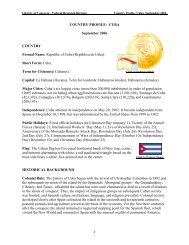1 - American Memory
1 - American Memory
1 - American Memory
You also want an ePaper? Increase the reach of your titles
YUMPU automatically turns print PDFs into web optimized ePapers that Google loves.
ports over the same months in the previous year. Figures available<br />
from the Department of Commerce demonstrate that that increase<br />
was only 11 percent when petroleum products are excluded.<br />
The more si^ificant fact is that Hawaii's total imports by sea from<br />
all sources durmg the third quarter of 1971. excluding petroleum prod-<br />
ucts, totaled only 191,415 tons, a decline of 67.4 percent from the<br />
587,400 tons whicli normally would have been imported were the strike<br />
not in effect.<br />
Critics of S. 1566, the Senate bill, made considerable use of the<br />
testimony of Dr. Shelley Mark, director of the Hawaii Department of<br />
Planning and Economic Development, which was prepared in Januai-y<br />
1972, part way through the 19< 1-72 west coast longshore strike. Dr.<br />
Mark indicated that in his view key shortages do not appear in Hawaii<br />
until well into the third month of a strike, making remedial action un-<br />
necessary until that time unless there is a complete shutdown of all<br />
U.S. mainland ports.<br />
One of the reasons shortages may not be immediately evident is that<br />
Hawaii's vulnerability to snipping stoppages forces our businessmen<br />
to carry huge inventories. Of course, this sharply increases the cost of<br />
doing business in Hawaii, as I indicated earlier, and drives up con-<br />
sumer prices.<br />
Further, Dr. Mark's assessment was made while Seatrain was still<br />
serving Hawaii under east cost maritime labor-management agree-<br />
ments, a service no longer available to Hawaii since Seatrain termi-<br />
nated service to the Island State last April.<br />
It has also been suggested that H.R. 7189 is at odds with current<br />
policies of the executive branch and with an emerging pattern of in-<br />
dustrial harmony.<br />
I certainly endorse, as does the report of the President's National<br />
Commission for Industrial Peace, published last May, the eflForts of<br />
labor and management to find new procedures and set up new mecha-<br />
nisms to settle their disputes without resort to strikes or lockouts. I<br />
share the hope that this will lead to an atmosphere of more har-<br />
monious collective bargaining. I do not believe, however, that the<br />
minimal impact of H.R. 7189 on the hours worked by west coast long-<br />
shoremen and maritime labor will interfere with these efforts to im-<br />
prove labor-management relations.<br />
It has been charged that H.R. 7189 does not provide an even-handed<br />
approach to dealing with bona fide emergencies since it would cover<br />
west coast stoppages but not disputes in Hawaii or the Pacific Islands.<br />
To this I would respond that Hawaii stoppages are not covered be-<br />
cause (1) there has been only one extended dispute affecting shipping<br />
commerce with Hawaii since World War II which was Hawaii-cen-<br />
tered: (2) Hawaii disputes are amenable to public pressure from the<br />
fellow-citizens of those engaged in the dispute; and (3) disputes in<br />
Hawaii are subject to State action under the Hawaii Dock Seizure<br />
Act, which authorizes the Governor to seize and operate the docks<br />
in an emergency.<br />
The people of Hawaii do indeed believe that they are able to—and<br />
rightfully should—cope with shipping tieups within their own State.<br />
They feel it is equally true, however, that remedial legislation is needed<br />
which will protect them from disputes which are far beyond their



![Albert Einstein Papers [finding aid]. Library of Congress. [PDF ...](https://img.yumpu.com/21604228/1/190x245/albert-einstein-papers-finding-aid-library-of-congress-pdf-.jpg?quality=85)





![American Colony in Jerusalem Collection [finding aid]. Library of ...](https://img.yumpu.com/17941275/1/190x245/american-colony-in-jerusalem-collection-finding-aid-library-of-.jpg?quality=85)



![Piccard Family Papers [finding aid]. - American Memory - Library of ...](https://img.yumpu.com/17941234/1/190x245/piccard-family-papers-finding-aid-american-memory-library-of-.jpg?quality=85)


